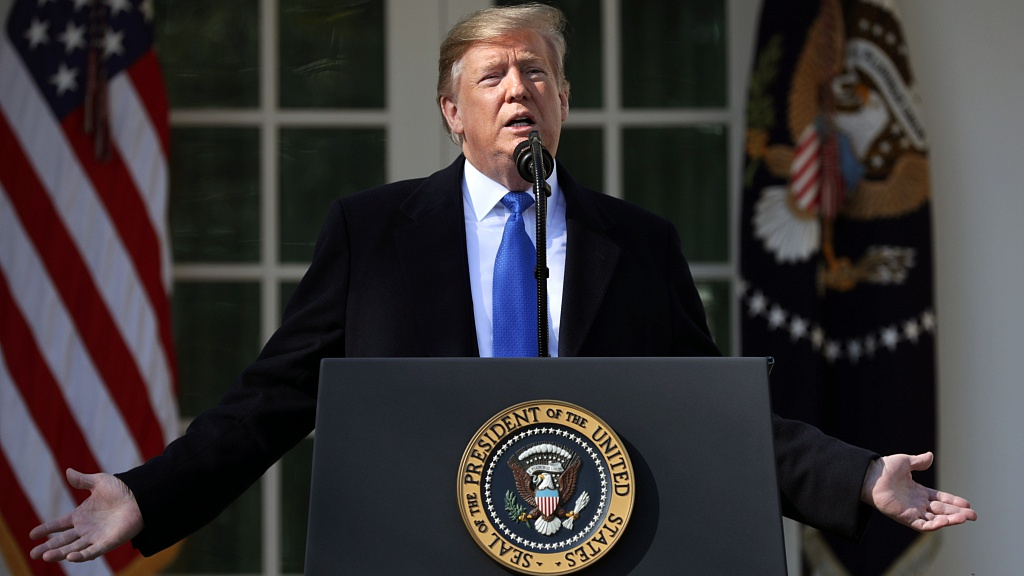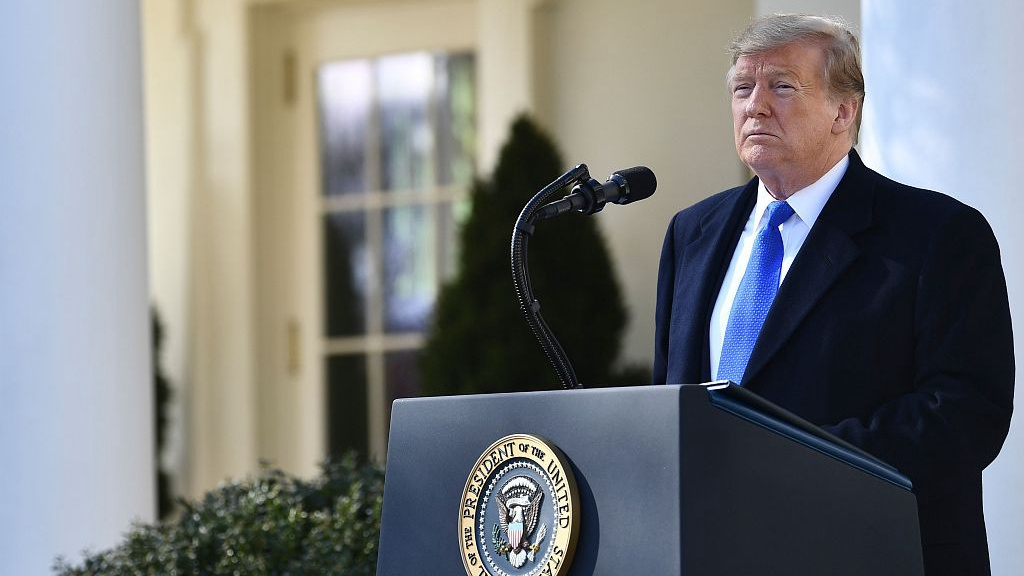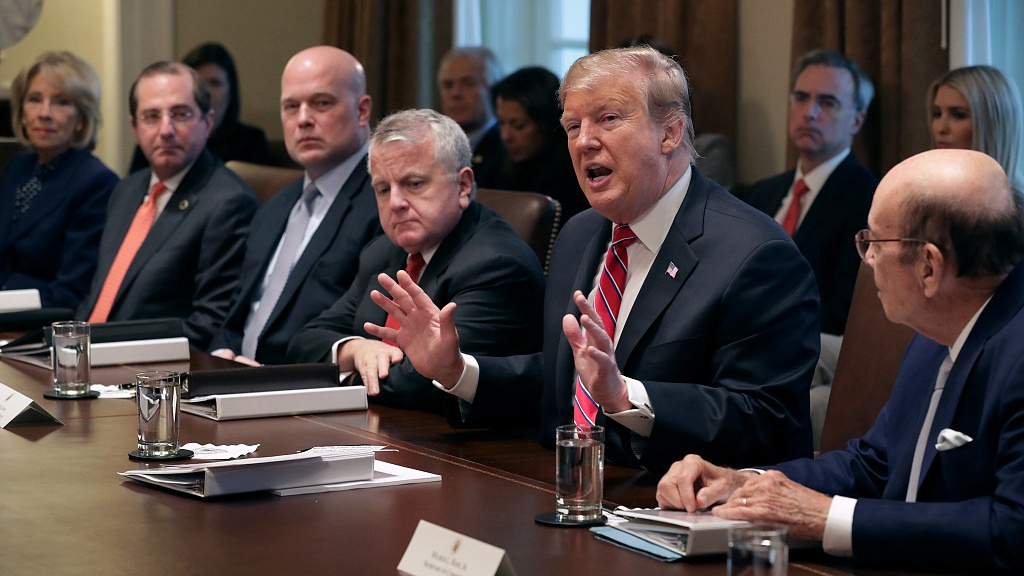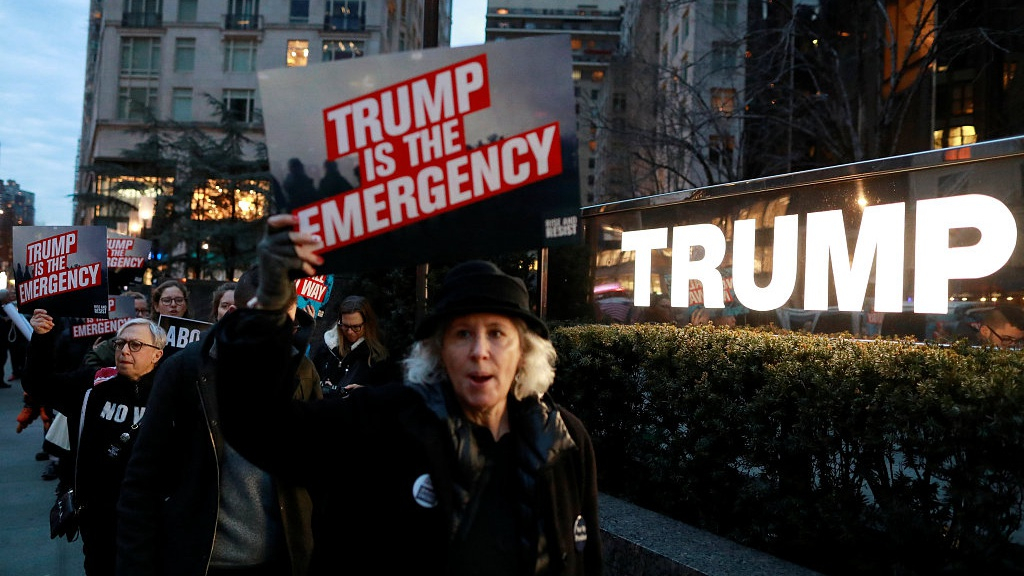03:39

President Donald Trump on Friday declared a national emergency in a bid to fund his promised wall at the U.S.-Mexico border without congressional approval, an action Democrats vowed to challenge as a violation of the U.S. Constitution.
The Republican president's move to circumvent Congress represented an escalation in his efforts to make good on a 2016 presidential campaign pledge to build a wall to halt the flow into the country of illegal immigrants, who Trump says bring crime and drugs.

U.S. President Donald Trump delivers remarks in the Rose Garden at the White House in Washington, DC, February 15, 2019. /VCG Photo
U.S. President Donald Trump delivers remarks in the Rose Garden at the White House in Washington, DC, February 15, 2019. /VCG Photo
Hours after Trump's announcement, the Democratic-controlled House of Representatives' Judiciary Committee said it had launched an investigation into the emergency declaration.
In a letter to Trump, committee Democrats asked him to make available for a hearing White House and Justice Department officials involved in the action. They also requested legal documents on the decision that led to the declaration, setting a deadline of next Friday.
“We believe your declaration of an emergency shows a reckless disregard for the separation of powers and your own responsibilities under our constitutional system,” said the letter signed by Chairman Jerrold Nadler and other top Democrats on the panel.
'We will defend our constitutional authorities in every remedy available'
Nancy Pelosi, the Democratic speaker of the House, and top Senate Democrat Chuck Schumer swiftly responded to Trump's declaration.
“The president's actions clearly violate the Congress's exclusive power of the purse, which our Founders enshrined in the Constitution,” they said in a statement. “The Congress will defend our constitutional authorities in the Congress, in the courts, and in the public, using every remedy available.”
The western U.S. state of California is planning to sue the Trump administration over the president's declaration of a national emergency on the southern border with Mexico, said California Governor Gavin Newsom on Friday.
In response, the president acknowledged his order would face a lengthy court fight. “I expect to be sued. I shouldn't be sued... We'll win in the Supreme Court,” Trump predicted.

William Barr, U.S. attorney general, departs as an announcement by U.S. President Donald Trump in the Rose Garden at the White House in Washington, DC, U.S., February 15, 2019. /VCG Photo
William Barr, U.S. attorney general, departs as an announcement by U.S. President Donald Trump in the Rose Garden at the White House in Washington, DC, U.S., February 15, 2019. /VCG Photo
Trump may have also undermined his administration's argument about the urgency of the situation when he told reporters, “I didn't need to do this. But I'd rather do it much faster.”
In their letter to Trump, House Judiciary Democrats said that language had left them “troubled.”
Both the House and the Senate could pass a resolution terminating the emergency by majority vote. However, that measure would then go to Trump, who would likely veto it. Overriding the veto would require a two-thirds vote in both chambers.
Trump says a wall is needed to curb illegal immigrants and illicit drugs coming across the border. But statistics show illegal immigration via the border is at a 20-year low and that many drug shipments come through legal ports of entry.
He estimated his emergency declaration could free up as much as eight billion U.S. dollars to pay for part of the wall. Estimates of its total cost run as high as 23 billion U.S. dollars.
Republicans concerned
Some congressional Republicans expressed dismay following Trump's announcement.
Greg Walden, a senior House Republican, said on Twitter he was “deeply concerned about the precedent that this action sets.”
Republican Senator Thom Tillis of North Carolina said in a statement that Trump's declaration was not a solution.

U.S. President Donald Trump talks to reporters during a meeting of his cabinet in the Cabinet Room at the White House in Washington, DC, February 12, 2019. /VCG Photo
U.S. President Donald Trump talks to reporters during a meeting of his cabinet in the Cabinet Room at the White House in Washington, DC, February 12, 2019. /VCG Photo
“It wouldn't provide enough funding to adequately secure our borders, it would likely get tied up in litigation, and most concerning is that it would create a new precedent that a left-wing president would undoubtedly utilize to implement their radical policy agenda while bypassing the authority of Congress,” Tillis said.
Other Republicans, such as Senator Lindsey Graham, were supportive.
Trump signs the spending bill
Trump on Friday also signed a bipartisan government spending bill that would prevent another partial government shutdown by funding several agencies that otherwise would have closed on Saturday.
The funding bill represented a legislative defeat for him since it contains no money for his proposed wall – the focus of weeks of conflict between him and Democrats in Congress.
Trump made no mention of the bill in rambling comments to reporters in the White House's Rose Garden.

People gather to protest against U.S. President Donald Trump's declaration of a national emergency to build a border wall, at Trump International Hotel & Tower in Manhattan, New York, U.S., February 15, 2019. /VCG Photo
People gather to protest against U.S. President Donald Trump's declaration of a national emergency to build a border wall, at Trump International Hotel & Tower in Manhattan, New York, U.S., February 15, 2019. /VCG Photo
He had demanded that Congress provide him with 5.7 billion U.S. dollars in wall funding as part of legislation to fund the agencies. That triggered a historic, 35-day December-January government shutdown that hurt the U.S. economy and his opinion poll numbers.
By reorienting his quest for wall funding toward a legally uncertain strategy based on declaring a national emergency, Trump risks plunging into a lengthy legislative and legal battle with Democrats and dividing his fellow Republicans – many of whom expressed grave reservations on Friday about the president's action.
Fifteen Democrats in the Republican-controlled Senate introduced legislation on Thursday to prevent Trump from invoking emergency powers to transfer funds to his wall from accounts Congress has already committed to other projects.
(Cover: U.S. President Donald Trump speaks on border security during a Rose Garden event at the White House in Washington, DC, February 15, 2019. /VCG Photo)
Source(s): Reuters






